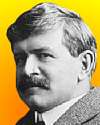 (source)
(source)
|
Stephen Leacock
(30 Dec 1869 - 28 Mar 1944)
English-Canadian writer and economist who was a professor but in his spare time wrote very popular humorous books and publications. While he was a young boy, his family emigrated to Canada (1876) and settled on a farm north of Toronto.
|
Science Quotes by Stephen Leacock (7 quotes)
Advertising may be described as the science of arresting the human intelligence long enough to get money from it.
— Stephen Leacock
In The Garden of Folly (1924), 123.
Astronomy teaches the correct use of the sun and the planets. These may be put on a frame of little sticks and turned round. This causes the tides. Those at the ends of the sticks are enormously far away. From time to time a diligent searching of the sticks reveals new planets. The orbit of the planet is the distance the stick goes round in going round. Astronomy is intensely interesting; it should be done at night, in a high tower at Spitzbergen. This is to avoid the astronomy being interrupted. A really good astronomer can tell when a comet is coming too near him by the warning buzz of the revolving sticks.
— Stephen Leacock
In Literary Lapses (1928), 128.
How can you shorten the subject? That stern struggle with the multiplication table, for many people not yet ended in victory, how can you make it less? Square root, as obdurate as a hardwood stump in a pasture nothing but years of effort can extract it. You can’t hurry the process. Or pass from arithmetic to algebra; you can’t shoulder your way past quadratic equations or ripple through the binomial theorem. Instead, the other way; your feet are impeded in the tangled growth, your pace slackens, you sink and fall somewhere near the binomial theorem with the calculus in sight on the horizon. So died, for each of us, still bravely fighting, our mathematical training; except for a set of people called “mathematicians”—born so, like crooks.
— Stephen Leacock
In Too Much College: Or, Education Eating up Life, with Kindred Essays in Education and Humour (1939), 8.
I acquired such skill in reading Latin and Greek that I could take a page of either, and distinguish which language it was by merely glancing at it.
— Stephen Leacock
Quoted, without source, in Des MacHale, Wit (1999, 2003), 31.
In earlier times they had no statistics and so they had to fall back on lies. Hence the huge exaggerations of primitive literature, giants, miracles, wonders! It's the size that counts. They did it with lies and we do it with statistics: but it's all the same.
— Stephen Leacock
In Model Memoirs and Other Sketches from Simple to Serious (1971), 265.
Natural Science treats of motion and force. Many of its teachings remain as part of an educated man's permanent equipment in life.
Such are:
(a) The harder you shove a bicycle the faster it will go. This is because of natural science.
(b) If you fall from a high tower, you fall quicker and quicker and quicker; a judicious selection of a tower will ensure any rate of speed.(c) If you put your thumb in between two cogs it will go on and on, until the wheels are arrested, by your suspenders. This is machinery.
(d) Electricity is of two kinds, positive and negative. The difference is, I presume, that one kind comes a little more expensive, but is more durable; the other is a cheaper thing, but the moths get into it.
Such are:
(a) The harder you shove a bicycle the faster it will go. This is because of natural science.
(b) If you fall from a high tower, you fall quicker and quicker and quicker; a judicious selection of a tower will ensure any rate of speed.
(d) Electricity is of two kinds, positive and negative. The difference is, I presume, that one kind comes a little more expensive, but is more durable; the other is a cheaper thing, but the moths get into it.
— Stephen Leacock
In Literary Lapses (1918), 130.
The landlady of a boarding-house is a parallelogram—that is, an oblong figure, which cannot be described, but which is equal to anything.
— Stephen Leacock
In 'Boarding-House Geometry', Literary Lapses (1928), 26.
 In science it often happens that scientists say, 'You know that's a really good argument; my position is mistaken,' and then they would actually change their minds and you never hear that old view from them again. They really do it. It doesn't happen as often as it should, because scientists are human and change is sometimes painful. But it happens every day. I cannot recall the last time something like that happened in politics or religion.
(1987) --
In science it often happens that scientists say, 'You know that's a really good argument; my position is mistaken,' and then they would actually change their minds and you never hear that old view from them again. They really do it. It doesn't happen as often as it should, because scientists are human and change is sometimes painful. But it happens every day. I cannot recall the last time something like that happened in politics or religion.
(1987) -- 


